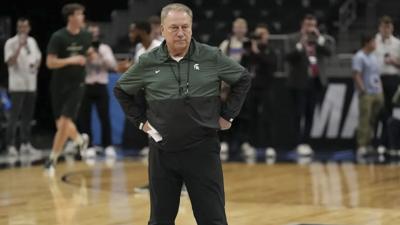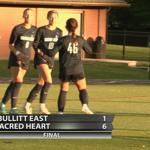LOUISVILLE, Ky. (WDRB) -- Tom Izzo warned us.
"I'm gonna get myself in trouble," he said. That's when you start taking notes.
He didn't just raise his voice Tuesday. He raised the roof. Four minutes of NCAA angst. No commercial break. Just pure, unfiltered Izzo — steam from the collar, words flying faster than a G League waiver wire.
The Hall of Fame Michigan State coach was fired up over college basketball's latest eligibility twist: Louisville landed a commitment from London Johnson, a 2026 recruit with three years of G League experience. Not long ago, that kind of move would've been blocked.
Louisville | Kentucky | Indiana | Eric Crawford
But now? It's not even unprecedented. Santa Clara did it weeks ago.
Izzo wasn't attacking Louisville (at least not directly). But he was blasting the rule and the decision-makers behind it.
"To me, it's ridiculous. It's embarrassing," he said. "I love my job. I don't respect my profession. And I don't respect whoever is doing this — whoever made those decisions — because they're afraid some lawyer is going to sue them."
He wasn't done.
"You hit a sore spot for me," Izzo said. "The transfer portal is enough. We have no rules. And now we've just taken no rules and added more no rules. I feel bad if the kid came out early. Maybe we should help kids make good decisions instead of letting them make bad ones and say, 'Oh boy I'll just go back.' But the unintended consequences are the kids who are already there get squeezed out, lose opportunities and transfer — and we just keep going in circles."
Izzo also admitted he had no idea this was allowed — though that's partly on him and his compliance staff. Santa Clara's move didn't make headlines but it was public. Still, his larger point stands: The NCAA could've at least sent out a memo.
"The NCAA has to regroup," he said.
He's not wrong. But he might be late.
We may not see many more cases like this, because players aren't choosing the G League anymore — not when they can make more money and build more brand in Lexington, Lawrence or Louisville than in Henderson or Stockton.
Why grind in front of 800 fans on a Tuesday night in Sioux Falls when you can play in front of 20,000 at the KFC Yum! Center on ESPN?
The best players — high school and otherwise — are coming to college. And they're bringing their agents, entourages and accountants (if they're smart) with them.
But Izzo's bigger question still deserves attention: Who is college basketball for?
Is it for the high school senior who signs early and believes in a plan? Or the 23-year-old journeyman who washes out of the pros and parachutes in with a head start and a highlight reel?
There's no easy answer. And that's the problem. Because the answer used to be obvious.
College basketball was for college students. Now it's for everyone. For a year. A semester. Maybe a weekend.
The transfer portal aged up the sport. NIL accelerated it. If fans — and coaches — feel uneasy about that shift, I understand.
Revenue sharing ≠ profit sharing
While we're here, let me add one thing I don't understand to go along with what Izzo doesn't.
If college sports are generating so much money schools must now share it with athletes — and I agree with that principle — then why are so many of those schools borrowing money to do it?
If they're flush with cash, why the fundraising blitz?
Why are universities — not just athletic departments — pre-spending future media deals and tapping rainy-day reserves?
Because this isn't profit-sharing. It's revenue-sharing. And those are not the same thing.
If schools had to split actual profits — after covering stadiums, scholarships, charter flights, assistant coaches, Olympic sports and all the support staff — the numbers would look a lot smaller.
And NIL? It was supposed to reflect a player's true name, image and likeness value.
Instead, it's become a cleverly disguised delivery system for pay-for-play.
We're all pretending not to notice. But we do.
What now?
College basketball is in a strange place, somewhere between One Shining Moment and Shark Tank.
It has a choice to make. Not just about eligibility, but identity.
Right now, it's becoming more professional, more fluid, more transactional. But you can't evolve in that direction while still claiming — especially in the halls of Congress — that this is a college game for college kids.
That's the tension.
There are more questions than answers about where this is going and how sustainable it really is.
But for now, it's less likely these college pros will get off Izzo's lawn than it is they'll buy it, lease it to a collective, and stream their commitment video from the porch.
College Basketball Coverage:
Louisville coach Pat Kelsey sits down with WDRB ahead of exhibition opener
CRAWFORD | Louisville just landed a G League vet. How is that even possible?
CRAWFORD | Louisville's Kobe Rodgers isn’t a 5-star — but he is a national champion
Copyright 2025 WDRB Media. All Rights Reserved.











